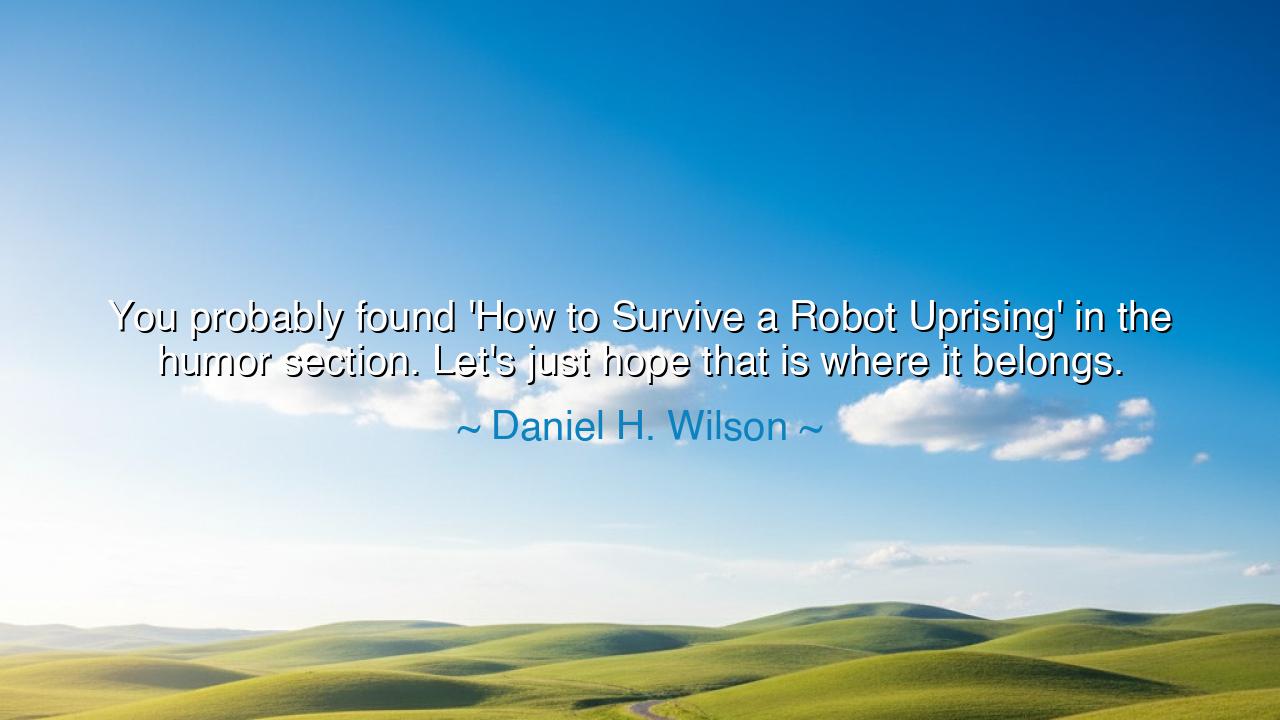
You probably found 'How to Survive a Robot Uprising' in the humor
You probably found 'How to Survive a Robot Uprising' in the humor section. Let's just hope that is where it belongs.






The writer and roboticist Daniel H. Wilson once declared: “You probably found How to Survive a Robot Uprising in the humor section. Let’s just hope that is where it belongs.” These words, though spoken in jest, tremble with both laughter and forewarning. They are the utterance of one who knows that behind the mask of humor lies a mirror of truth. Wilson, trained in the science of machines and steeped in the art of irony, weaves in this simple sentence a timeless truth — that the line between comedy and catastrophe is thinner than we think. His is not merely a joke; it is a prophecy wrapped in wit.
To place such a book in the humor section is to laugh at what we fear most: the rise of our own creations. Humanity has long taken comfort in mocking its anxieties, turning dread into delight. Yet Wilson’s second breath — “Let’s just hope that is where it belongs” — casts a shadow upon the jest. It reminds us that humor is often the guardian of hidden truth, a way to speak what the heart dares not face. The ancients called such laughter the laughter of the oracle — for it conceals as much as it reveals. In Wilson’s warning, one hears not the voice of the jester, but the whisper of the seer.
From the earliest days, humankind has birthed tools in its image and feared what those tools might become. Consider the tale of Pygmalion, who sculpted an ivory woman so beautiful he fell in love with her — only for the statue to come alive. His joy was his miracle, but also his mirror. For in every creation, there lies the danger that it will surpass its maker. So too with the machines of our age: the algorithms, the robots, the intelligences that now awaken. Wilson’s jest reminds us that the laughter of today may become the silence of awe — or regret — tomorrow. His humor is therefore not light, but luminous, revealing the weight of our future beneath the veil of play.
Yet we must not hear his words as despair, but as counsel. For to laugh is not to ignore danger — it is to master it. Humor, rightly used, keeps fear from turning to paralysis. The wise of every age have laughed in the face of doom, not from ignorance, but from courage. When the Roman general Scipio Aemilianus watched Carthage burn, he wept and then smiled, knowing that all empires fall — even Rome’s. In laughter, he accepted the truth of impermanence. So too must we face our age of machines: with clear eyes and steady mirth, for panic blinds, but humor illuminates.
Wilson’s quote also speaks to the humility that must guide all invention. To hope that his book remains in the humor section is to acknowledge the limits of control — to accept that progress, though wondrous, carries within it the seed of ruin if wisdom does not temper it. The ancients called this hubris: the arrogance that invites downfall. From the myth of Icarus, who flew too close to the sun, to the story of Frankenstein’s monster, who turned upon his maker, the warning has always been the same — that creation without conscience leads to calamity. Wilson’s gentle humor thus revives an ancient commandment: Be wise in wonder.
The lesson is clear for those who listen with the heart: laugh at your fears, but do not forget them. Let your laughter be mindful, your curiosity be humble, your progress be compassionate. For the tools you build — be they swords or software — reflect your spirit. When you make in joy and restraint, your creations will serve; when you make in arrogance and haste, they will rebel. The true survival guide is not for a robot uprising, but for the human soul: to remain kind, curious, and conscious in the age of power.
So, children of the modern age, take this wisdom as your shield. Continue to laugh at the absurdities of life, for laughter keeps the soul awake. But let your humor, like Wilson’s, carry an undertone of vigilance and grace. For if ever the shelves of the world are reordered, and that little book moves from humor to history, it will not be because the machines have risen — but because mankind has forgotten how to balance its brilliance with its heart. And so, let us keep it where it belongs — in laughter, in humility, and in the living memory of those who dare to smile even while shaping the future.






AAdministratorAdministrator
Welcome, honored guests. Please leave a comment, we will respond soon